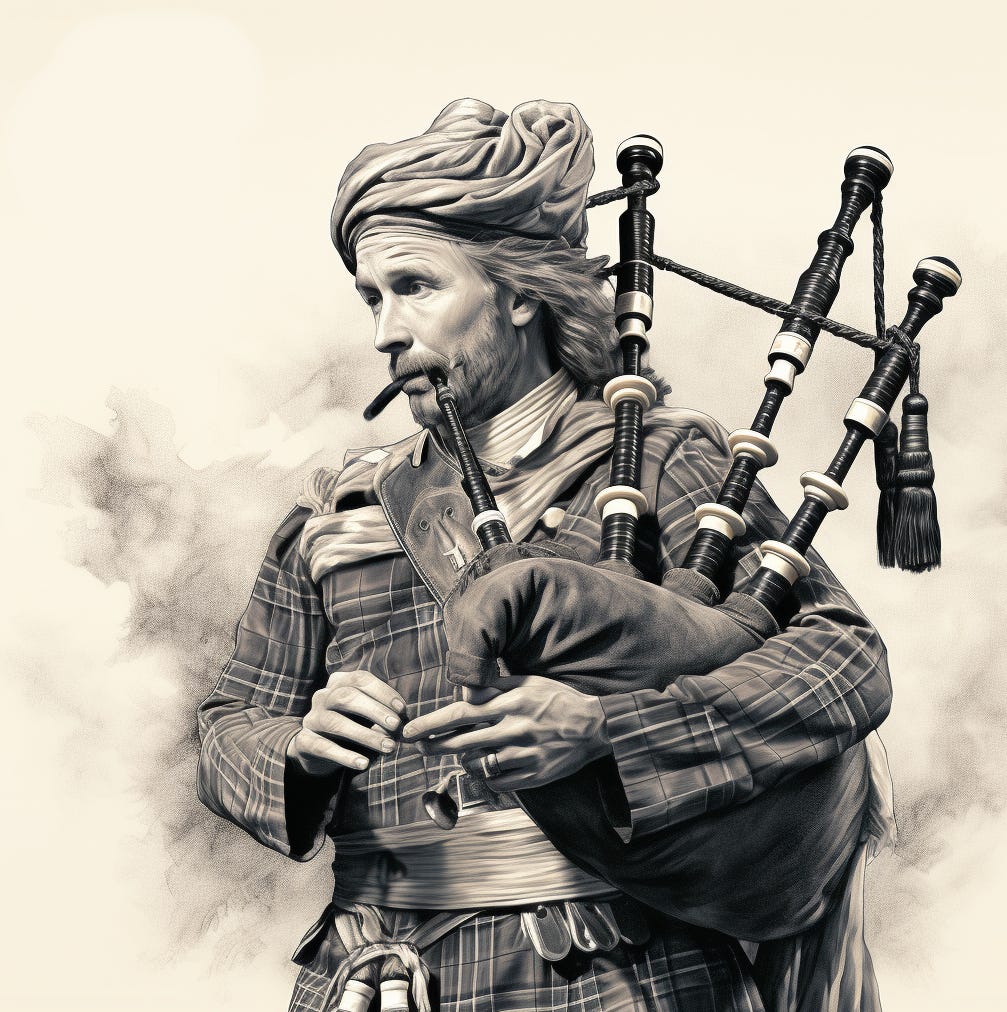The MacCrimmon Piper’s Lament: A Tale of Music and Loyalty from the Highlands
In the rich tapestry of Scottish clan history, few stories resonate as poignantly as the tale of the MacCrimmon Piper’s Lament. It is a narrative that weaves together the strands of music, loyalty, and the inevitable march of time, set against the backdrop of the ruggedly beautiful Isle of Skye. This story is not just about a song; it is about the soul of a people and the enduring legacy of the MacCrimmons, hereditary pipers to the Chiefs of Clan MacLeod.
The Origins of the Lament
The MacCrimmons, who resided near Dunvegan Castle, the ancestral home of the MacLeods, were renowned for their extraordinary skill in playing the bagpipes. Their music was not just entertainment; it was the voice of the clan, echoing through the valleys and over the hills of Skye, an integral part of the clan’s identity. The MacCrimmons were so revered that their home, Boreraig, became known as the most prestigious piping college in all of Scotland.
The Fateful Call to War
The story takes a fateful turn with the outbreak of the Jacobite uprising in 1745. The MacLeods, like many other Highland clans, were swept up in the turbulent tides of the rebellion. As the clan prepared to join the fray, a sense of foreboding hung in the air. It was then that the head of the MacCrimmon family, aware of the grim prospects of war, composed a haunting tune, a lament that was both a farewell to peace and a premonition of doom.
"MacLeod’s Wizard Flag" and Its Significance
The lament came to be known as “MacLeod’s Wizard Flag,” named after the legendary Fairy Flag of the MacLeods, a talisman of the clan believed to possess mystical powers. The piper’s lament was an ode to this flag and a reflection of the heavy hearts that marched behind it. The tune was not just a composition of notes; it was a story told through music, a story of love for their land, their people, and the deep sorrow of leaving it all behind.
The Prophecy and the Piper
As the legend goes, the MacCrimmon piper who composed the lament had a premonition that he would not return from the war. This prophecy added a layer of somberness to the tune, infusing it with a sense of finality and resignation. The lament was played as the clan departed, its notes echoing across the landscape, a poignant soundtrack to a journey that many would not survive.
The Battle and the Piper’s Fate
The MacLeods, accompanied by their piper, fought bravely in the uprising. However, as fate would have it, the prophecy came true. The MacCrimmon piper, who had foreseen his death, fell during the conflict. His lament, composed on the eve of battle, became his own elegy, a musical epitaph that outlived the piper and became immortalized in Scottish lore.
The Legacy of the Lament
The MacCrimmon Piper’s Lament transcends its origins as a tune of mourning and loss. Over time, it has come to symbolize the resilience and spirit of the Scottish people. The lament is a reminder of the sacrifices made in the name of loyalty and freedom, and it continues to be played as a tribute to those who have gone before.
Conclusion
The tale of the MacCrimmon Piper’s Lament is more than just a footnote in Scottish history; it is a reminder of the power of music to capture the deepest emotions of the human heart. It speaks of loyalty, of love for one’s homeland, and the inevitable sorrow that comes with change and loss. As long as the pipes are played in the Highlands, the story of the MacCrimmon Piper and his haunting lament will continue to resonate, a timeless echo of Scotland’s past.





